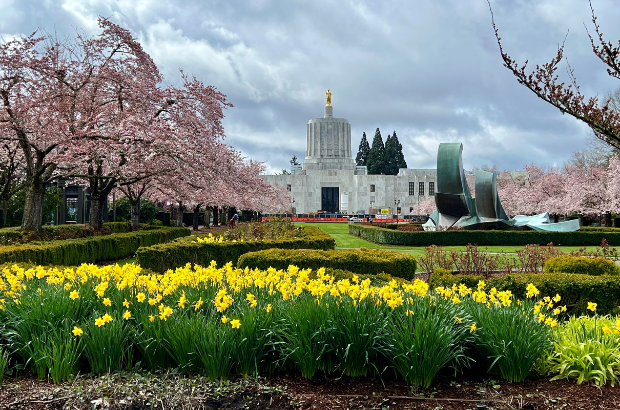Climate Budget for 2024: Lowering Families’ Housing and Transportation Costs
A Climate Budget brings an equitable and rapid transition from fossil fuels to clean energy closer within reach while increasing the resilience of our communities. Funding to enable urgently needed home repairs and efficiency upgrades and to make new and used electric vehicles more affordable will lower the cost of living, improve health and resilience, and reduce climate pollution. Supporting needed investment in these popular programs was previously requested during the 2023 legislative session. We can’t keep kicking the can down the road.
Affordable Energy Bills and Resilient Housing: $15M for Healthy Homes Program
- What is it? The Healthy Homes program, run by the Oregon Health Authority (OHA), helps low-income folks afford the changes needed to keep their home livable. This unique program is focused on health and safety, allowing for home repairs like radon and mold abatement, fixing holes in walls or roofs, and energy efficiency upgrades. Healthy Homes fills in gaps left by other state and federal energy efficiency and weatherization funding. It can be braided together to help pay for home repairs for low-income households that will cut climate pollution, improve health, and lower energy bills.
- Why it’s a priority now: We’re in a housing and climate crisis. The Healthy Homes program addresses both. Solving Oregon’s housing crisis is about more than building more housing, it’s about keeping vulnerable people from losing their current homes. An estimated 49% of Oregonians live in housing built before 1980. Much of this housing is energy-inefficient and in need of repairs. This leads to higher utility bills, sickness, and lower quality of life, especially for those most vulnerable among us. The Healthy Homes program directly helps address these issues - but it is poised to run out of money without more funding now!
Affordable Access to Clean Transportation: $20M for Charge Ahead EV rebates
- What is it? Everyone deserves a chance to participate in the green energy transition, but not everyone can afford to do so. The Charge Ahead Rebate program, run by DEQ, is one proven solution to help level the electric vehicle (EV) purchasing field. The Charge Ahead Rebate offers low-and moderate-income Oregonians a $5,000 cash rebate for the purchase of a new or used EV in addition to a standard EV rebate. EV drivers can save thousands of dollars on fuel and maintenance costs compared to gas-powered cars. Increasing equitable access to EVs can improve household budgets and reduce climate and air pollution.
- Why it’s a priority now: Electrifying vehicles is a top priority to reduce climate pollution from our biggest source: the transportation sector. Due to unprecedented demand, the Oregon Clean Vehicle Rebate Program, including the Charge Ahead Rebate program, ran out of funds, and the program entered suspension on May 1, 2023. Without more funding now for Charge Ahead rebates, the program will not be able to stay open for more than two months in 2024. Without Charge Ahead rebates available, the gap between those who can afford to go electric and those who currently cannot will widen.
Our Priority Bills to Accelerate our Clean Energy Future and Promote Economic Development:
- SB 1559: Updating the State’s Greenhouse Gas Goals for Climate Leadership: Oregon’s statewide goals for reducing climate pollution have not been updated in 15 years, and it's past time to remedy that. We are out of step with the best available science of limiting warming to 1.5℃ that has guided more recent climate goals for the international community, the U.S. federal government, and our neighbors of Washington and California. These pollution reduction targets are a critical way to demonstrate Oregon’s commitment to climate action and to measure our progress toward achieving those goals.
- HB 4015: Removing Barriers to Siting Battery Storage Projects: We need to update our state’s siting processes to allow for newer technologies like stand-alone battery storage. This bill lessens the barriers for a developer who wants to build a much-needed battery energy storage system by allowing them to use the state Energy Facility Siting Council (EFSC) process to site the project.
- HB 4112: Attracting Clean Tech Leadership: Oregon should be a leader in attracting clean energy businesses and manufacturing. With Inflation Reduction Act incentives available to clean tech manufacturing like battery and heat pump components and other states putting together incentive packages, now is the time for Oregon to grab a slice of this economic development pie.
- HB 4080: Harnessing the Potential of Offshore Wind: Floating offshore wind on the Oregon coast has the potential to add 3 gigawatts of clean energy into our regional grid (enough to power at least one million homes). This bill would authorize the state to develop a “Roadmap” for offshore wind in Oregon. This Roadmap would engage stakeholders more deeply to ensure an inclusive, robust, and transparent process in developing this renewable resource. The bill also mandates fair labor standards for the construction and manufacturing of component parts.





